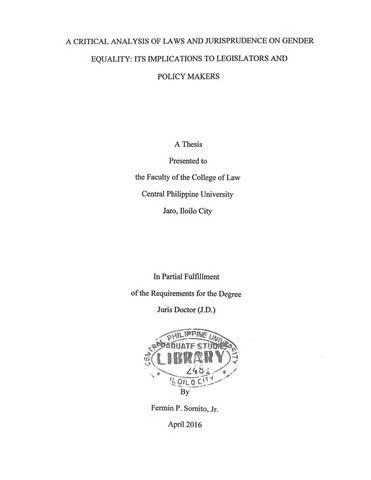A critical analysis of laws and jurisprudence on gender equality: Its implications to legislators and policy makers
| dc.contributor.adviser | Alibogha, Salex E. | |
| dc.contributor.author | Sornito, Fermin P. Jr. | |
| dc.date.accessioned | 2021-02-11T10:06:54Z | |
| dc.date.available | 2021-02-11T10:06:54Z | |
| dc.date.issued | 2016 | |
| dc.identifier.citation | Sornito, F. P., Jr. (2016). A critical analysis of laws and jurisprudence on gender equality: Its implications to legislators and policy makers (Unpublished postgraduate thesis). Central Philippine University, Jaro, Iloilo City. | en_US |
| dc.identifier.uri | https://hdl.handle.net/20.500.12852/315 | |
| dc.description | Abstract only | en_US |
| dc.description.abstract | This study is a qualitative research aimed to conduct a content analysis on certain laws and jurisprudence as to their adherence to the constitutional principle on gender equality and to determine its implications to legislators and policy makers. It tried to delve into the underlying reasons behind the enactment of sexist laws, as well as the contributing factors. The qualitative content analysis was employed in this study because it systematically analyzed the context of laws in the light of the gender equality clause in the 1987 Constitution. This research specifically intended to determine the laws and jurisprudence containing sexist provisions or principles which are favorable to men; the historical background of these laws or jurisprudence; the reasons or factors that contributed to the ratification of these laws or jurisprudence; whether or not there is a violation of Section 14, Article II of the 1987 Constitution, which recognizes the fundamental equality of men and women before the law; and determine its implications to current and future legislators or policy makers. The study found out that The Revised Penal Code, the Revised Rules of Court, the Family Code, the Labor Code, and the Civil Code of the Philippines contain provisions that are essentially unfair to women and gender insensitive; that the existence and prevalence of sexist/chauvinistic provisions are mainly attributed to the influence of the Spanish colonization or the Machismo culture back then; and that these provisions run contrary to Section 14, Article II of the 1987 Constitution, which recognizes the equality of men and women before the law. After an exhaustive search of related jurisprudence tackling on gender equality or women’s rights, the researcher has made noteworthy of one case: Jesus C. Garcia vs. Honorable Drilon, et. al., G.R. No. 179267, promulgated on June 25, 2013. This case underscores the triumph of R.A. 9262 (VAWC) over a question against its constitutionality raised by a husband on the ground that it violates that equal protection clause and due process clause. | en_US |
| dc.format.extent | ii, 104 leaves | en_US |
| dc.language.iso | en | en_US |
| dc.subject.ddc | GSL Theses 340.72 So68 | en_US |
| dc.subject.lcsh | Equality before the law | en_US |
| dc.title | A critical analysis of laws and jurisprudence on gender equality: Its implications to legislators and policy makers | en_US |
| dc.type | Thesis | en_US |
| dc.description.bibliographicalreferences | Includes bibliographical references | en_US |
| dc.contributor.department | College of Law | en_US |
| dc.description.degree | Juris Doctor | en_US |
| local.subject | Content analysis | en_US |
| local.subject | Gender equality | en_US |
| local.subject | Gender equality--jurisprudence | en_US |
| local.subject | Gender equality--laws and legislation | en_US |
| local.subject | R.A. 9262 | en_US |
Fichier(s) constituant ce document
Ce document figure dans la(les) collection(s) suivante(s)
-
Juris Doctor [144]


